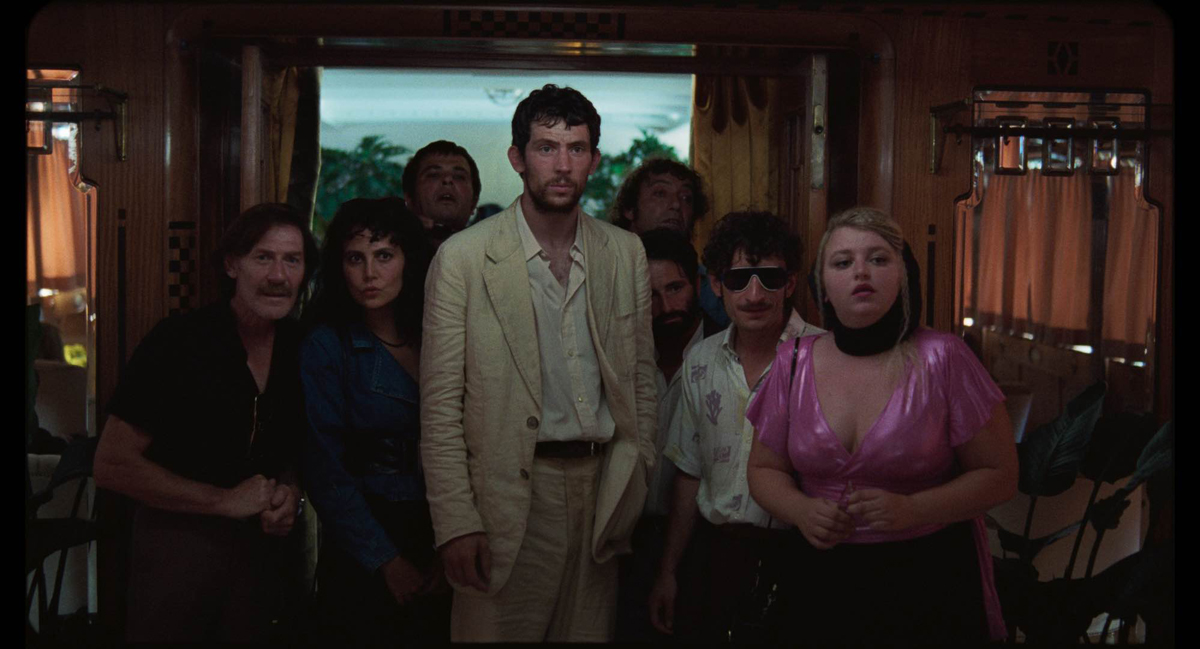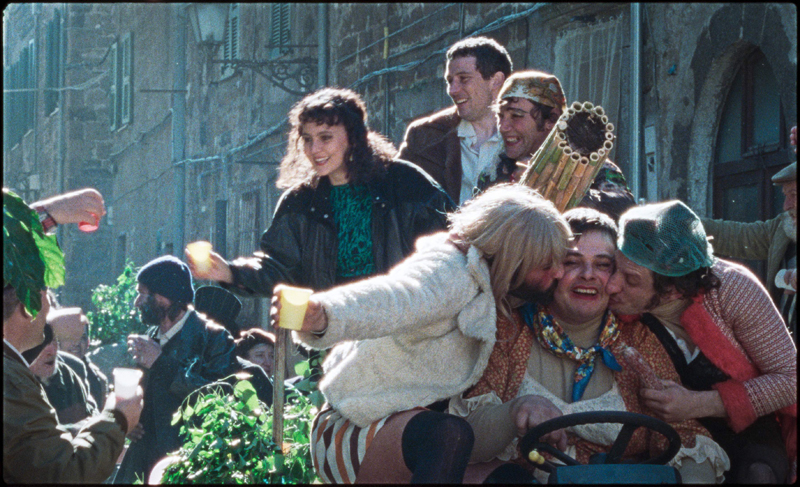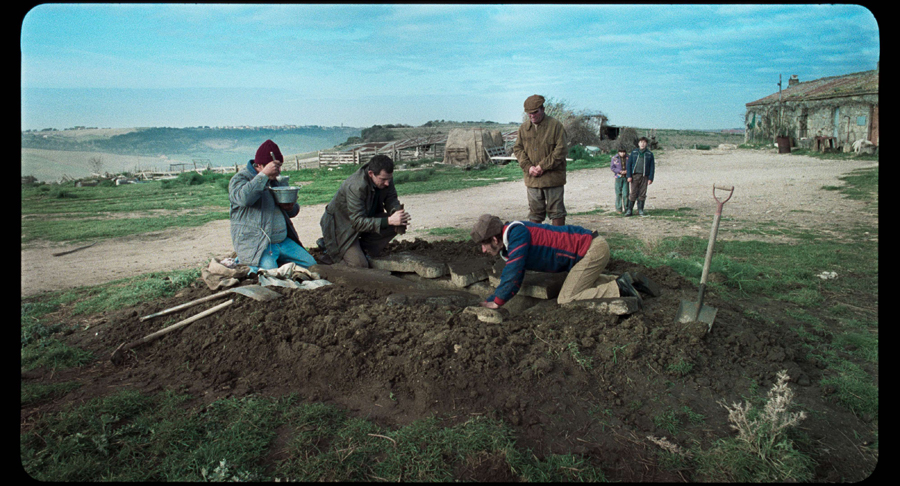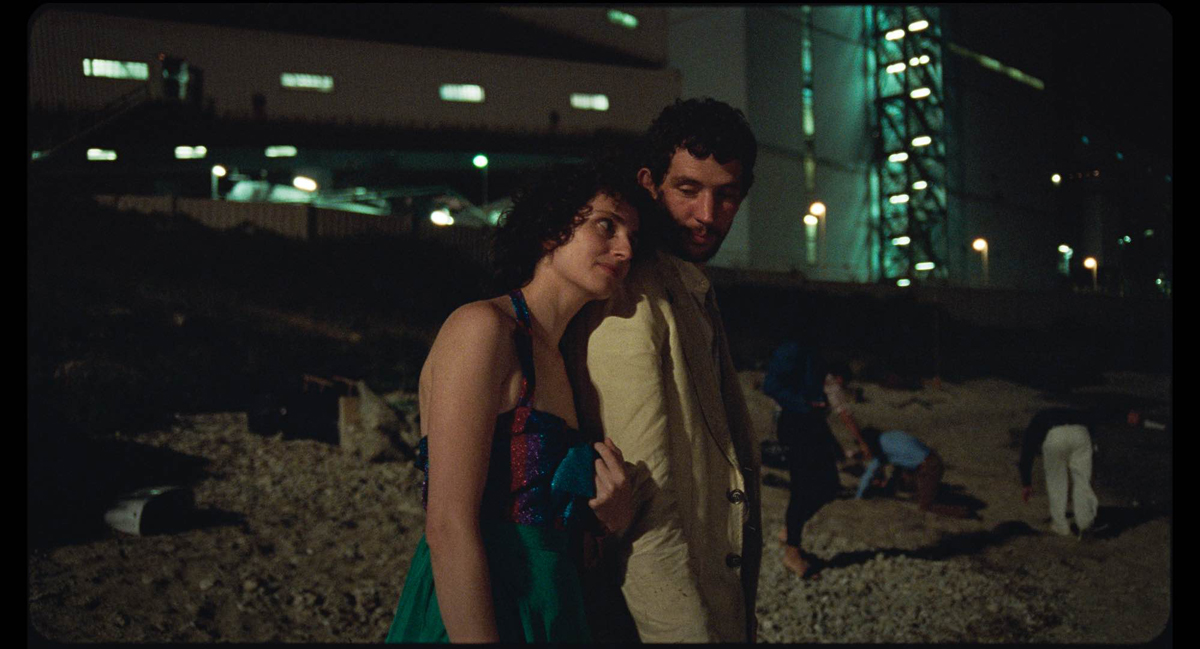 Michelle Orange
Michelle Orange
In Alice Rohrwacher’s hauntingly whimsical film, an archaeologist turned grave robber in 1980s Tuscany finds that some losses are buried
too deeply to be excavated.

Josh O’Connor as Arthur (center) in La Chimera. Courtesy Neon.
La Chimera, directed by Alice Rohrwacher, opens March 29, 2024
• • •
A folktale set in a flyspeck town in 1980s Tuscany, La Chimera, the fourth feature film from director Alice Rohrwacher, enfolds whimsy and earthy doses of Italo–magic realism into a story of ruin and extraction as restless and loosely bound as the antihero at its center. We meet that man, Arthur (Josh O’Connor), asleep on a train, visited in his dreams by a young woman named Beniamina (Yile Yara Vianello), a figure of disappeared love and perhaps of disappearance itself. Together with the three teenage girls sharing his compartment, the camera makes a study of this dozing, stubbled stranger, moving down from tight on his face to reveal crossed arms and the cuffs of his rumpled linen suit. Like much of what will follow (Rohrwacher cowrote the film with Carmelo Covino and Marco Pettenello), the question of Arthur’s origins takes a minute to clarify. He speaks decent Italian, but the local girls clock it right away: wherever this guy is headed is not where he’s from.
Returning to the rural town of Riparbella from a stint in jail of unspecified length, Arthur must be cajoled into accepting a ride from Pirro (Vincenzo Nemolato), a friend staking out the train station. As they veer up a hillside cliff in Pirro’s sky-blue beater, the camera jostles and shakes in an apparent effort to keep up. Shot by returning Rohrwacher collaborator Hélène Louvart, La Chimera also switches now and then between film stocks (35mm, 16mm, and Super 16) and features some sweetly crude camera tricks plus a sequence or two with a comically accelerated frame rate. The effect is one of winking eccentricity, an aesthetic in tension with Arthur’s air of haunted, free-floating bother. Though one translation of “la chimera” is “the fantasy,” the title’s invocation of a mythical hybrid beast—fascinating, perhaps, but less-than-functional—is just as apt.

Back row: Ramona Fiorini as Fabiana, Josh O’Connor as Arthur, and Giuliano Mantovani as Jerry; front row: Luca Gargiullo as Il portuale, Melchiorre Pala as Melchiorre, and Vincenzo Nemolato as Pirro in La Chimera. Courtesy Neon.
Along with Pirro, awaiting Arthur in Riparbella are the half-dozen cronies apparently connected to his jail time, a tin-roof shanty where he spends his nights, and Beniamina’s mother, Flora (a droll Isabella Rossellini), a black-lace-shrouded matriarch who lives in a crumbling villa, attended to by a chattering chorus of daughters and a woman named Italia (Carol Duarte), to whom Flora gives singing lessons in exchange for work as her servant. Stray English phrases betray Arthur’s British accent; Flora and others school him on Italian idiom, the words for tone-deaf and nosey parker. Flora and Arthur appear to conspire in the delusion of Beniamina’s eventual return; the terms of her vanishing and any question of Arthur’s involvement in it remain hidden, a thread the film is unwilling to pull. Instead, a series of capers ensue involving Arthur’s talent for hunting the unlovely landscape for buried treasure—in this case, the knickknacks and artifacts entombed with the ancient Etruscan dead. Using a dowsing rod, Arthur leads his crew to crypts that yield painted vases and other bits of pottery and ironwork. They bring the goods to a shadowy agent named Spartaco (played by Alba Rohrwacher, Alice’s sister), a black-market dealer who seeks to “estimate the inestimable,” invoking capital’s disregard for any value beyond that which the market will bear.

Melchiorre Pala as Melchiorre, Josh O’Connor as Arthur, and Vincenzo Nemolato as Pirro in La Chimera. Courtesy Neon.
Arthur’s worth to this group lies solely in what Spartaco calls his “gift of finding lost things.” The connection that Arthur, an archaeologist who drifted, has to these objects and his need to unearth them is another of the movie’s dangling threads. More than a finder of lost things, Arthur emerges as an angel of loss, drawn to the relics of lives—and deaths—that do not belong to him. “Some people rob graves to escape poverty,” a troubadour sings in one of the film’s fanciful, expository musical interludes. “Others are just victims of the yearning for wealth that afflicts humanity.” We are meant to understand Arthur as bound to his task by more than money: something of Beniamina, of a soul that slipped its lead, compels him to dig, collect, dream of the past these objects presided over—and might release when seen anew.

Carol Duarte as Italia and Josh O’Connor as Arthur in La Chimera. Courtesy Neon.
With cheekbones for days and a pursed-lip scowl, O’Connor plays Arthur as a moody, inward giant striding among the scampering, low-slung tombaroli. Rohrwacher teases a romantic spark between them, but Italia proves more foil than love interest to Arthur’s lone wanderer. Though she harbors the odd superstition, where Arthur appears lost to “his chimeras,” as one character puts it, Italia’s schemes and scavenging serve pragmatic ends. Daffy but undeluded, she is set on survival, exuding as cheerful and creative an acceptance of her lot as can be managed with no real prospects and two children to feed. Horrified by the tombaroli and their presumption of ownership over the dead, Italia seeks a more abiding renewal from ruin—fixing up an abandoned train station to house a commune of women and children. From the ruin that is Arthur she is able to extract little more than a shared cigarette.
Less interested in telling a story than casting a spell, La Chimera wears its influences (Pasolini, Fellini, the Taviani brothers) loudly and with pride, not unlike the men who in an early sequence don dresses and rouge to preen and buss their way through the town’s Epiphany parade. Not quite an ensemble piece, the film suffers for its divided focus between the amorphous plight of its central character and the unruly collective he leads. La Chimera finds its own register in scenes where that collective operates as more than background players—notably an evening beach party that leads to the gang’s most lucrative discovery yet. Charm and danger swirl as an oldster belts a few lines at the mic and Italia dances in a sequined halter dress. The men imitate and then surround her, grabbing at her skirt. On the sidelines, Fabiana (Ramona Fiorini), the sole woman in the group, gives Arthur a look as old as the scene they are watching unfold. Do something, it says. Get her out of there. And, as if called from his private reveries for just a moment, he does.
Michelle Orange is the author, most recently, of Pure Flame: A Legacy.